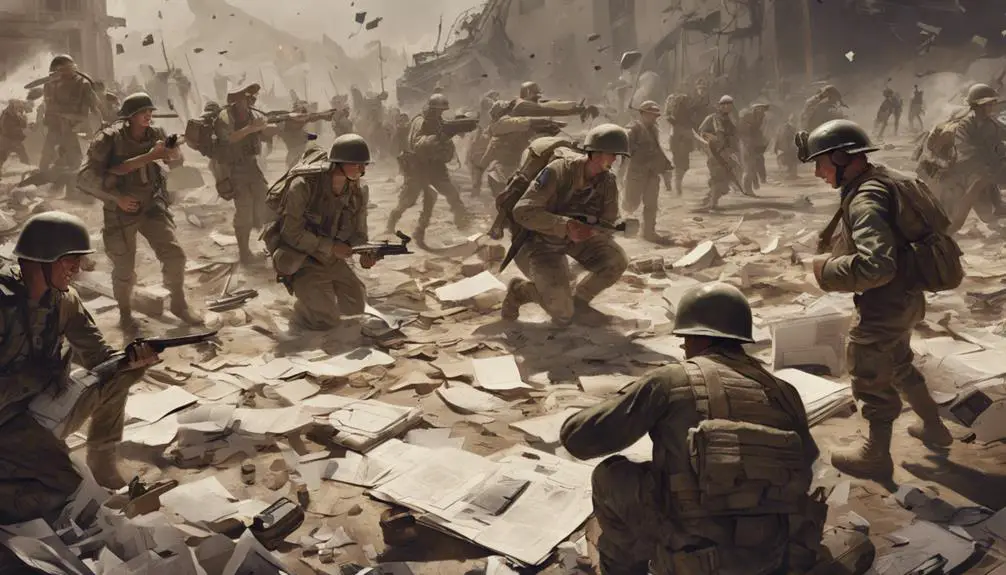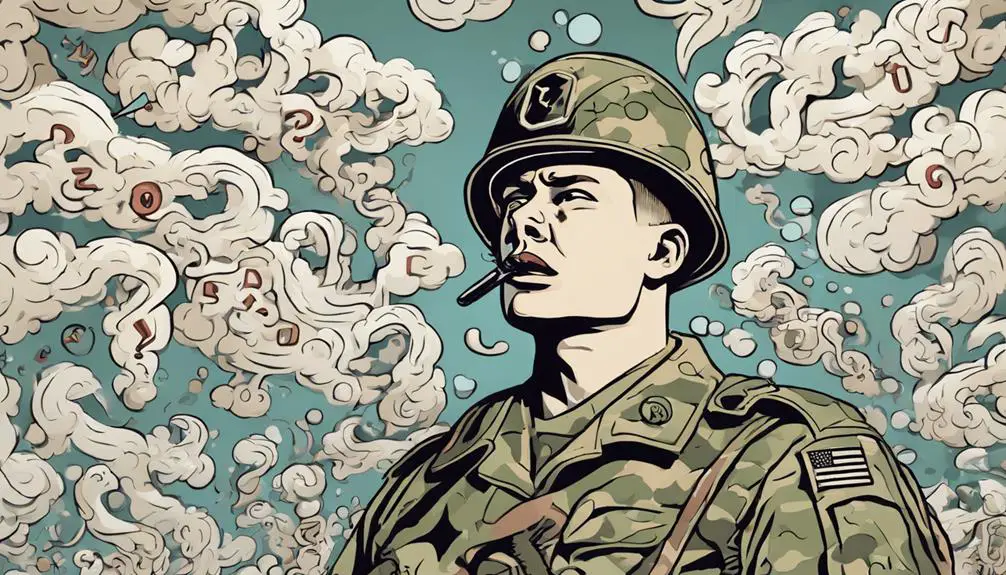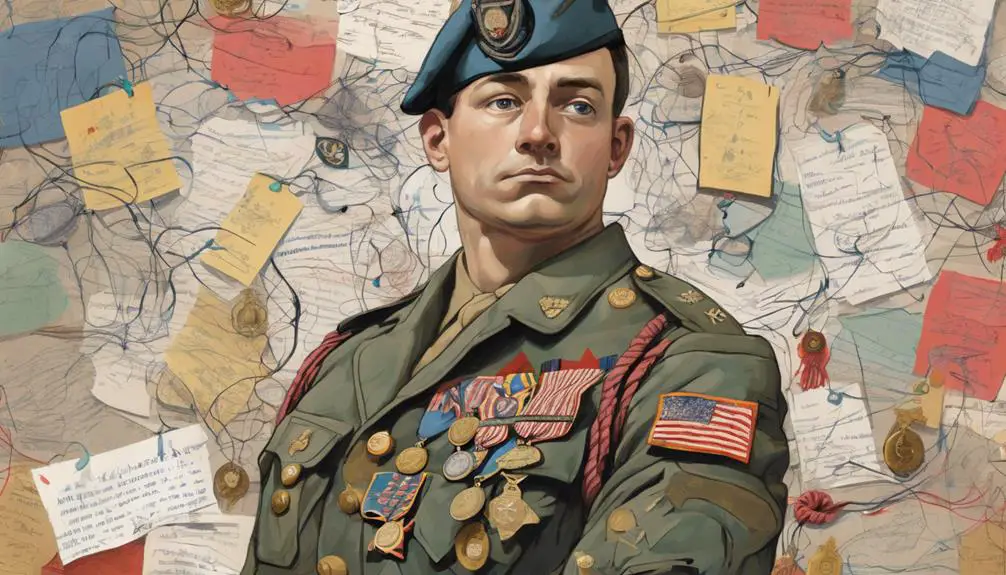When you're thrust into the chaos of a military operation, the last thing you need is to be flummoxed by baffling slang that can mean the difference between life and death. You're not alone in feeling completely messed up by military slang. Phrases like 'Oscar Mike' and 'Fubar' can leave you scratching your head. But decoding these phrases is essential for mission success and staying alive. Military slang is a complex world of acronyms, historical events, and cultural influences. As you venture deeper, you'll uncover the hidden meanings behind peculiar phrases and unravel the intricate world of military jargon.
Flummoxing Phrases of the Frontline

When you're on the frontline, you'll encounter phrases that sound like a foreign language, such as 'Oscar Mike' or 'SITREP,' which can leave you feeling like a FNG (Freaking New Guy). It's a recipe for Combat Confusion, where critical information gets lost in translation. The last thing you need is a Frontline Fiasco, where miscommunication leads to mistakes that put lives at risk.
In the heat of the moment, deciphering military slang can be a luxury you can't afford. You're already dealing with high-stress situations, and unfamiliar terminology only adds to the chaos. It's not just about understanding what's being communicated; it's about responding quickly and accurately to ensure the success of the mission.
When phrases like 'Oscar Mike' (On the Move) or 'SITREP' (Situation Report) become a mystery, it's a recipe for disaster.
To avoid Combat Confusion, it's essential to familiarize yourself with military terminology. Recognizing and understanding these phrases can mean the difference between success and failure on the frontline. By staying one step ahead of the language barrier, you can focus on what matters most – completing the mission and staying alive.
Bizarre Battlefield Lingo Explained
From 'Oscar Mike' to 'SITREP,' you'll encounter a plethora of bizarre battlefield lingo that can leave even the most seasoned veterans scratching their heads.
As you explore the world of military slang, you'll realize that it's a maze of confusing acronyms and forgotten origins. You might come across terms like 'FOB' (Forward Operating Base) or 'TOC' (Tactical Operations Center), which seem straightforward, but their meanings can vary depending on the context.
The origins of these terms are often shrouded in mystery, making it challenging to decipher their intended meaning. For instance, the term 'SITREP' is an abbreviation for 'Situation Report,' but its etymology is unclear. Similarly, 'Oscar Mike' is a phrase used to signify 'on the move,' but its origins are murky.
As you navigate this intricate world of military jargon, you'll encounter numerous examples of forgotten origins and confusing acronyms. Understanding these terms is essential, as they can have a significant impact on communication on the battlefield.
Military Malarkey: What's That Mean?

As you venture deeper into the labyrinth of military slang, you'll encounter an array of perplexing phrases like 'Military Malarkey,' which will leave you wondering what on earth they mean.
Delving into the origins of Malarkey reveals it emerged in the 1920s as a slang term for nonsense or foolish talk. Initially, it referred to deceptive or misleading language, often used to manipulate or deceive. Over time, the term evolved to encompass a broader meaning, encompassing not only deceitful language but also irrelevant or confusing information.
The Malarkey Evolution is a fascinating tale of linguistic adaptation. As military personnel interacted with civilians, the term spread beyond military circles, taking on a more colloquial connotation. It became a colloquialism for anything deemed nonsensical or confusing.
Today, 'Military Malarkey' serves as a catch-all phrase for confusing or misleading information, often used to express frustration or skepticism. Understanding the origins and evolution of Malarkey provides insight into the complex, ever-changing landscape of military slang.
Decoding the Weird and Wacky
You'll stumble upon a plethora of bizarre and bewildering phrases in military slang, such as 'Bite the bullet' or 'Break a leg,' which seem to defy logical explanation. But, as a code breaker, you'll soon discover that these phrases have a rich history and hidden meanings.
Take 'Bite the bullet,' for instance, which originated in the mid-19th century when soldiers were given a bullet to bite on before undergoing a painful medical procedure. This peculiar phrase has since evolved to mean facing a challenging task with courage.
When it comes to language quirks, military slang is full of them. Phrases like 'Break a leg' or 'Painting the town red' may sound nonsensical, but they've a method to their madness. These quirks often stem from historical events, cultural influences, or clever wordplay.
As you explore further into the world of military slang, you'll uncover a complex web of references, allusions, and clever turns of phrase. So, if you're ready to crack the code, get ready to embark on a fascinating journey into the weird and wacky world of military slang.
Unraveling the Military's Craziest Slang

Delving into the world of military slang, you'll encounter phrases that are downright baffling, like 'Fubar' or 'Snafu,' which have mysterious origins and unexpected meanings. As you dive deeper, you'll realize that military slang is a unique phenomenon that has evolved over time. This Slang Evolution is a fascinating process, shaped by the military's need for brevity, secrecy, and humor.
Military Mythbusters, those who debunk popular myths, would agree that the origins of these phrases are often shrouded in mystery. For instance, 'Fubar' is rumored to have originated from a World War II phrase, 'Fouled Up Beyond All Recognition.' Similarly, 'Snafu' allegedly stands for 'Situation Normal: All Fouled Up.' While these explanations are plausible, they're not definitively proven.
Despite the uncertainty surrounding their origins, military slang continues to thrive. It's a reflection of the military's ability to adapt and create its own language. As you explore this world, you'll uncover more bizarre phrases, each with its own unique history and quirks.
Frequently Asked Questions
Is Military Slang Only Used in the United States?
You might assume that military slang is a uniquely American phenomenon, but that's not entirely true. While the US has certainly contributed to the lexicon, military slang has international roots.
In fact, many countries have their own brand of military slang, reflecting local cultural significance. International adoption of military slang has led to a rich tapestry of expressions, with different countries putting their own spin on military lingo.
Are There Any Benefits to Using Military Slang?
As you step into the ranks, you'll discover that military slang is more than just a quirky lingo – it's a cultural glue that binds troops together.
Using military slang can boost team morale, fostering a sense of camaraderie and shared cultural identity. It's a secret handshake that signals 'I'm part of this tribe.'
Can Civilians Use Military Slang in Everyday Conversations?
When deciding whether to use military slang in everyday conversations, you should consider the implications of cultural appropriation.
Are you borrowing phrases as a form of respect, or are you contributing to the watering down of their original meaning?
Language evolution is a natural process, but it's crucial to be mindful of the context and potential misappropriation.
Are There Different Slang Terms for Different Military Branches?
You'll find that each military branch has its own distinct slang terms, known as Branch Variations. The Army has its own service idioms, like 'HOOAH' (meaning 'yes' or 'agreed'), while the Navy uses 'BZ' (meaning 'well done').
The Air Force has 'Bingo Fuel' (minimum fuel levels), and the Marines use 'Oorah' (a battle cry). These unique terms reflect each branch's culture and are often used to reinforce camaraderie and esprit de corps.
Is Military Slang Only Used for Communication in Combat Zones?
You might be surprised to know that 80% of military communication takes place outside of combat zones.
So, is military slang only used for communication in combat zones? Not quite. Tactical lingo and battlefield dialect are used in various settings, including training exercises, everyday conversation, and even in formal briefings.
While these terms are essential in high-stress combat situations, they're also used to build camaraderie and facilitate quick communication in other contexts.
Conclusion
As you've navigated the labyrinth of military slang, you've encountered a dizzying array of phrases that defy logic. Like a cryptic code, they've been passed down through the ranks, leaving outsiders bewildered.
But now, the fog has lifted, and the veil has been lifted on these enigmatic expressions. Like a battle-hardened warrior, you've emerged victorious, armed with the knowledge to decipher the weird and wacky world of military malarkey.







